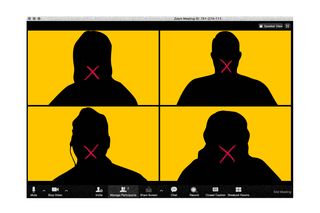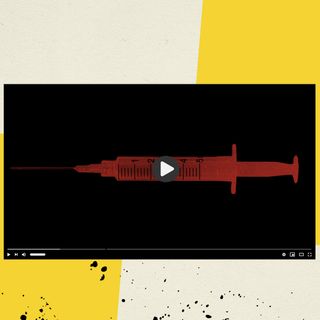
Students, Professors Fear Eavesdropping, Digital Surveillance as Classes Shift Online
Self-censorship is stifling free-wheeling academic conversations outside the safety of campus.

University campuses have historically provided students with opportunities extending far beyond the scope of academia. They enable conversations that expand students’ worldview about existing power structures and allow them to reflect on their own social position. Remote learning during the pandemic has resulted in the loss of face-to-face interactions and safe spaces – both things crucial for this kind of self-reflection and open conversation.
*
The widespread police brutality on campuses and arrests of prominent academics and scholars in the past years had already created an environment of censorship and fear in universities. But now, the first impediment in students’ ability to have open conversations lies closer to home – or rather, at home.
A student of applied psychology at the University of Delhi disclosed that he is always cautious when discussing issues like sexuality and politics at home in fear of being overheard by his parents. “I feel more confident discussing these topics in person. When I am unable to … understand body language and tone of the person I’m discussing this with, it tends to make me unsure of where the discussion is headed and makes me more nervous.”
“My pronouns are he/him but when I’m talking in front of my parents, I have to refer to myself as she/her.”
Women and LGBTQ+ students are especially vulnerable at home due to a lack of resources and safe spaces – concerns that translate into further self-censorship. “We were discussing gender and sexuality in an online class, and I wanted to talk about how our professors could be more inclusive in their own conversations, but my mother entered the room, and I didn’t say anything,” one student shared.
“My pronouns are he/him but when I’m talking in front of my parents, I have to refer to myself as she/her. During classes, I discuss my experiences as a queer person openly but there is always this fear of being outed. It has become more prominent during remote classes,” explained another student. This fear of being overheard by parents and subsequently outed was shared by closeted LGBTQ+ students across universities, with many professors openly urging students to practice caution during their online classes.
“Our [history] class discussions revolve around caste, gender, homosexuality, nudity, and gods,” a student at one of the central universities said. “So, our professors want us to keep headphones on at all times.” If somebody doesn’t have headphones available at a particular time, the professors urge students to ensure nobody is around to overhear, the student added.
“[Students] can only share their experience provided there is a safe space for discussion.”
Much like students, professors, too, are wary of listening ears – although, for them, the fear is of being overheard by administrative forces and the State. A professor of sociology at one of the central universities in Delhi shared, “I believe that we should acknowledge the fact that the autonomous teaching-learning space of educational institutions has come under great scrutiny ever since 2016. Students confided that they fear discussing certain concepts and theories, which are very much prescribed in their syllabus. For example, Manifesto to the Communist Party by Karl Marx is mandatory reading in undergraduate courses. But with the discourse around ‘Urban Naxal,’ they fear that discussing class struggle can land them into jail.”
Another professor, currently teaching English at a state university, discussed their anxieties about the exposure of online teaching. “There is a fear of constant surveillance since these videos are uploaded on Google Classroom. One must constantly remind oneself not to get carried away because everything is being recorded and everything can be scrutinized and interpreted to suit the contexts. It’s the post-truth era after all.”
*
Remote learning in India has been a largely exclusionary exercise, with students from underserved communities finding it impossible to attend online classes due to a lack of resources. As a result of almost half the student body being missing, online classes lack diverse perspectives that are crucial for holistic discourse. The online medium thus simply cannot offer the gamut of open and radical conversation that in-person classes can. These conversations are further stifled by the very real anxieties of surveillance and subsequent repercussions. Remote learning has therefore failed on two major fronts – enabling diversity and accessibility in education and creating safe spaces to have open discussions.
While university spaces undoubtedly reproduce the existing hierarchies of the outside world, they also provide many students the opportunity to unlearn their biases and prejudices through such discussions. This process has also been largely absent due to remote learning during the pandemic. “Many conversations in my family made me aware of their underlying Islamophobia and the fact that they see lower-income workers differently,” a student, who preferred staying anonymous, shared. “It took getting away from home and having conversations with people from more diverse backgrounds for me to see that even I had beliefs rooted in me that were problematic. Now I don’t have the opportunity to have those conversations.”
“[Students] can only share their experience provided there is a safe space for discussion. A space of non-judgment helps students understand why their experience differs from each other, it makes them reflect on their social location in society. And the relevance of such space is felt especially now when we realize that even to say words like sex, intercourse, or menstruation. Students feel hesitation, as these words are tabooed and carry social stigma,” the sociology professor further explained.
“It is here that one realizes the importance of the classroom, a space provided by college because these discussions linger in the minds of students and are taken forward to the cafeteria, gardens, library, hostel room where students share this with their classmates, seniors, and friends. With online learning, we don’t have this space,” said the professor from Delhi.
Yameena Zaidi is a student of sociology at the University of Delhi. She writes about the intersection of gender, marginalization, and politics.
Related


YouTube Will Remove Misleading Videos About Coronavirus Vaccines
